 MyDogBreeds
MyDogBreeds PekePoo is originated from United States but Korean Mastiff is originated from South Korea. PekePoo may grow 50 cm / 19 inches shorter than Korean Mastiff. PekePoo may weigh 65 kg / 143 pounds lesser than Korean Mastiff. PekePoo may live 3 years more than Korean Mastiff. Both PekePoo and Korean Mastiff has same litter size. Both PekePoo and Korean Mastiff requires Moderate maintenance.
PekePoo is originated from United States but Korean Mastiff is originated from South Korea. PekePoo may grow 50 cm / 19 inches shorter than Korean Mastiff. PekePoo may weigh 65 kg / 143 pounds lesser than Korean Mastiff. PekePoo may live 3 years more than Korean Mastiff. Both PekePoo and Korean Mastiff has same litter size. Both PekePoo and Korean Mastiff requires Moderate maintenance.
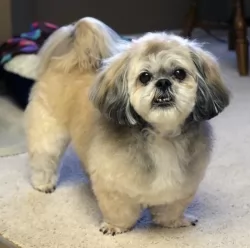 As a cross between a Peingese and a Poodle, your cute Peekapoo as he is also known, isn't a purebred dog. They first started making their appearance in the 1900s, in fact it was believed to be developed in the 1950s, being one of the oldest designer dog breeds.
As a cross between a Peingese and a Poodle, your cute Peekapoo as he is also known, isn't a purebred dog. They first started making their appearance in the 1900s, in fact it was believed to be developed in the 1950s, being one of the oldest designer dog breeds.
He was bred to be a a low-shedding, hypoallergenic companion dog. Both the parent dogs have their own unique, long histories. Dog experts aren’t too sure where the Pekepoo originated from.
This dog breed isn’t recognized by the American Kennel Club, because it is a hybrid breed, but it is recognized by the American Canine Hybrid Club.
 This large breed dog is also known as the Mee Kyun Dosa. In spite of his huge size, he isn’t aggressive at all and is bred to be a companion dog.
This large breed dog is also known as the Mee Kyun Dosa. In spite of his huge size, he isn’t aggressive at all and is bred to be a companion dog.
He was originally developed to be a working dog. The dog was developed in the late 1800’s from European and Asian working breeds. Those interested in dog breeds suspected that a crossing of the Japanese Tosa-Inu with the Neapolitan Mastiff and the Dogue de Bordeaux brought about the breed. They also thought that the Saint Bernard and English Mastiff were brought in later on as well.
These large molosser dogs have been developed through years of inbreeding. It is one of the biggest dogs in Korea.
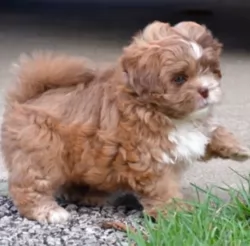 People love these little dogs because of their lack of shedding and it having a hypoallergenic coat. The coat is soft and can be wavy to curly with some feathering around the ears and tail.
People love these little dogs because of their lack of shedding and it having a hypoallergenic coat. The coat is soft and can be wavy to curly with some feathering around the ears and tail.
It is medium length and comes in a variety of colors such as fawn, cream, white, black, apricot or chocolate. The coat can have a mix of some of these colors too. This is a small dog that stands at between 23–26cm and weighs in the region of 4 to 9kg. He has floppy, low set ears and bright brown eyes.
They're such cute little dogs, loving and loyal to their human family. However, there is another side to them and they can be independent, aloof and stubborn. They’re very intelligent little dogs and will require both mental and physical stimulation to prevent boredom.
Because’s he’s so smart, you won’t have any trouble training him new skills. He’ll do well with children in the home as well as with pets, especially once he’s been trained and socialized.
He is able to settle into life in the city or the countryside. Even though he is a small dog, he will have to have his share of exercise if he is to remain healthy and content. They are dogs that love to be cuddled and petted ad he gets along well with everyone in the family.
Even though he is a true family pet, loving and loyal, he becomes a good watchdog too as he wants to protect all those he loves.
 You can’t help but stare at the Korean Mastiff because of his strong, muscular neck of loose skin that forms dewlaps. His face is wrinkled and he has a cumbersome, sluggish gait.
You can’t help but stare at the Korean Mastiff because of his strong, muscular neck of loose skin that forms dewlaps. His face is wrinkled and he has a cumbersome, sluggish gait.
He is a large dog standing at anything between 59 to 76cm in height, both male and female. He can weigh between 65 to 74kg. He is noticeable because of his fairly loose fitting coat, which is short and smooth and which is a rich, shiny reddish, orange or brown colour.
The nose of the dog is broad and dark, the ears soft and floppy and he has eyes which are set wide apart.
The Korean Mastiff is reserved with strangers but he is friendly and even tempered with his human family, making an ideal pet.
He is looked upon as a gentle giant, being an oversized playmate for children and he also tolerates other pets in the home.
He isn't an overly energetic dog, but that doesn't mean he shouldn't be exercised. He will need long walks to avoid him putting on weight.
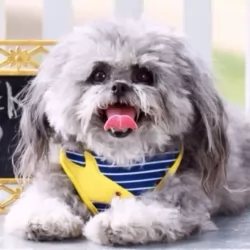 Your Pekepoo is such a gentle, sweet dog, making the perfect family pet. He is gentle, loving and amicable with his human family and wants to be involved in all their activities.
Your Pekepoo is such a gentle, sweet dog, making the perfect family pet. He is gentle, loving and amicable with his human family and wants to be involved in all their activities.
Coming from the Poodle and the Pekingese, he will have inherited some personality from each of these two popular dog breeds.
He is coming into your home ready to make you a splendid pet and companion and he asks nothing more than good care from you as a responsible dog owner.
 Your huge Korean Mastiff is a good natured dog who isn’t aggressive. He loves being with his human family and makes a particularly good pet when he has been trained and socialized.
Your huge Korean Mastiff is a good natured dog who isn’t aggressive. He loves being with his human family and makes a particularly good pet when he has been trained and socialized.
He likes a firm but fair owner who takes a leader-of-the-pack role. In spite of his largeness and sluggishness, he can be quite agile and makes a good watchdog too.
All round, the Korean Mastiff, known as a gentle giant, is capable of making you a splendidly friendly, loving canine companion.
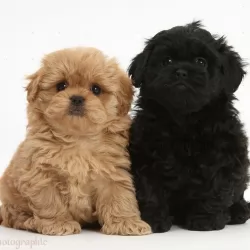 As with any dog, there are certain common dog ailments that you want to watch out for in your Pekepoo. Brachycephalic airway syndrome is one as well as dental disease and obesity.
As with any dog, there are certain common dog ailments that you want to watch out for in your Pekepoo. Brachycephalic airway syndrome is one as well as dental disease and obesity.
Because your Pekepoo has a somewhat squashed face, he may have abnormalities in the upper airways. Dogs with this syndrome have heavier breathing than other dogs and he might even have a cough. The troublesome part is that these breathing difficulties can put pressure on the cardiovascular system.
Small breed dogs are always at an increased risk of being obese and being obese can mean your dog possibly developing osteoarthritis, diabetes, cardiovascular disease, high blood pressure as well as other diseases.
 Treat your big Mastiff dog like the wonderful fur-child he is and make sure your attend to all his medical needs to avoid pain and discomfort for him.
Treat your big Mastiff dog like the wonderful fur-child he is and make sure your attend to all his medical needs to avoid pain and discomfort for him.
Cherry eye is a fairly common health issue with this breed. It affects the tear gland of the third eyelid, and if left untreated, can lead to ongoing eye problems.
All dogs have a third eyelid, as well as two tear producing glands to lubricate the eyes. Its an important protective component to eye health in dogs. When the connective tissue that holds the gland in place is damaged or weak, there is a red protrusion of the gland from the lower eye. This is a congenital disorder. Don’t ignore it, but get your pet to the vet so you can catch it early.
Canine bloat, known as gastric dilatation and volvulus can be a killer disease for your pet, more so with deep-chested, large breeds.
Gas accumulation is known as bloat, and its the accumulation of gas which can cause the stomach to rotate. A dog can go into shock from bloat. The reason for this is that the stomach expands, putting pressure on veins. Blood can’t flow as it should and the blood supply gets cut off to the stomach.
Your dog could be vomiting, restless, the stomach hard and bloated or he may be drooling. Dogs who gobble their food down and eat just one large meal a day have an increased susceptibility to GDV than other dogs.
The wrong ingredients of a dog’s diet can also contribute to bloat. High quality food and feeding your pet smaller meals can help.
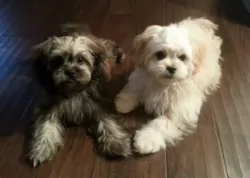 Your small designer Peekapoo will do well on a high quality kibble diet. Always check out the packaging and see how much to feed a small dog like this. It is better to give a dog 2 smaller meals a day as composed to one because with one they tend to gobble it up which can lead to a serious condition known as bloat.
Your small designer Peekapoo will do well on a high quality kibble diet. Always check out the packaging and see how much to feed a small dog like this. It is better to give a dog 2 smaller meals a day as composed to one because with one they tend to gobble it up which can lead to a serious condition known as bloat.
Dogs love simplicity and consistency with their food, but it is always to your dog’s benefit to feed him some home-made food too. Some chopped up boiled chicken, brown rice or pasta and some vegetables such as spinach, carrots and sweet potato added into the kibble occasionally will do him the world of good. Every now and again a little bit of raw meat can also be given.
Never leave your pet without a bowl of fresh, cool water.
Lively and energetic, your Peekapoo is going to need daily exercise. He will love the chance to sniff around and explore on your daily walks but he is ready to become more involved than that and will join you with hikes and swimming too. He is happiest when spending activity times with his human family. As with any dog, just make sure he doesn’t overdo it, especially on a hot day.
To keep your Pekepoo’s hair tangle-free, you’ll need to brush it twice a week. If you feel that his hair is getting too unruly, you can take him to the doggy parlor and have it trimmed into a shorter style. They’ll clip his nails at the same time, check inside his mouth for any signs of dental disease and check inside his ears too for dental infection.
 A Korean Mastiff is an easy dog to groom with his short smooth coat. He is a moderate shedder so a brush twice a week will be sufficient to maintain the shiny, smooth condition of his coat.
A Korean Mastiff is an easy dog to groom with his short smooth coat. He is a moderate shedder so a brush twice a week will be sufficient to maintain the shiny, smooth condition of his coat.
Because the dog has lots of skin and folds, these folds will need to be washed and kept clean as grime can collect.
While you're busy attending to his skin check his nails too and check inside and outside his ears for signs of redness and irritation.
Puppies use up more energy than mature adults, requiring a diet of good quality protein. Dogs that have been spayed or neutered will require less calories as will senior dogs.
Korean Mastiffs require high quality nutrition, and if its dry kibble, make sure its the best brand. Mix in some home-made food such as cooked chicken, brown rice and vegetables from time to time as well as some raw meat occasionally.
Protein and fat from good sources are top ingredients for your Korean Mastiff. Avoid food with allergens such as corn and wheat, sweeteners, preservatives and colorants.
Make sure your large pet has constant access to fresh water.